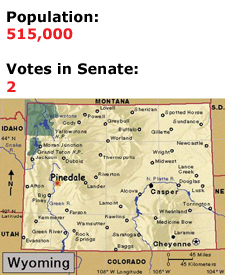Majority
 You've heard (way too many times) the facile comparison between legislating and making sausage. It's the kind of analogy that obscures the spectacular level of dysfunction now most impressively on display in the U.S. Senate. This institution has always been a problem with respect to the popular will, but under the current circumstances, the "world's greatest deliberative body" has become not the cooling saucer of democracy but a dousing bucket of cold water. There is, of course, no question that the Senate is an extremely undemocratic institution, according the same number of votes and, therefore, the same political power to every state, whether it is home to 36 million (California) or 500,000 (Wyoming). Even if the chamber's arcane rules allowed for voting on a majority-rule basis, it would be intrinsically unfair to larger population centers - i.e. the kinds of communities that most rely on social programs administered by the federal government.
You've heard (way too many times) the facile comparison between legislating and making sausage. It's the kind of analogy that obscures the spectacular level of dysfunction now most impressively on display in the U.S. Senate. This institution has always been a problem with respect to the popular will, but under the current circumstances, the "world's greatest deliberative body" has become not the cooling saucer of democracy but a dousing bucket of cold water. There is, of course, no question that the Senate is an extremely undemocratic institution, according the same number of votes and, therefore, the same political power to every state, whether it is home to 36 million (California) or 500,000 (Wyoming). Even if the chamber's arcane rules allowed for voting on a majority-rule basis, it would be intrinsically unfair to larger population centers - i.e. the kinds of communities that most rely on social programs administered by the federal government.But it's far more unfair than that. For one thing, under the rules of the senate, a single member can hold up important legislation and key appointments. And in a political moment such as the one we find ourselves in now, any piece of legislation must repeatedly achieve a 60-vote super majority to gain passage. If you combine the populations of all of the states that have 2 Democratic (or Dem-caucusing independent) Senators, that alone makes up more than half of the U.S. population. Those 158 + million people are represented by 44 out of 100 members. A bare majority in the Senate would require votes representing a far greater number than that. That in itself is remarkably limiting, given the important constitutional role the Senate plays in making and shaping legislation, ratifying treaties, confirming presidential appointees, and so on. When you combine that with the additional requirement that legislation - any legislation - must garner 60 votes to gain passage, this is a significant veto power over the will of the majority.
 The current situation in the Senate is such that the filibuster is a constant, a given. So the notion that any meaningful action will take place within its walls - landmark legislation supported by a broad swath of the American public - is beyond contemplation. It would be difficult under majoritarian voting procedures, but the 60-vote minimum requires the inclusion of so many watery centrists and "Democrats in name only" that the guts are always ripped out of whatever is under consideration. This is certainly true of the health insurance reform legislation. This will also be true of any other major initiative. After this year's experience, I am doubtful that they will even attempt to take up the Employee Free Choice Act... and I'm certain that, if they did, the Ben Nelsons (representing 1.8 million), Mary Landrieus (representing 4.8 million), and Joe Liebermans (representing 3.5 million) will easily thwart the will of members representing twice, three times, and even eight times as many people.
The current situation in the Senate is such that the filibuster is a constant, a given. So the notion that any meaningful action will take place within its walls - landmark legislation supported by a broad swath of the American public - is beyond contemplation. It would be difficult under majoritarian voting procedures, but the 60-vote minimum requires the inclusion of so many watery centrists and "Democrats in name only" that the guts are always ripped out of whatever is under consideration. This is certainly true of the health insurance reform legislation. This will also be true of any other major initiative. After this year's experience, I am doubtful that they will even attempt to take up the Employee Free Choice Act... and I'm certain that, if they did, the Ben Nelsons (representing 1.8 million), Mary Landrieus (representing 4.8 million), and Joe Liebermans (representing 3.5 million) will easily thwart the will of members representing twice, three times, and even eight times as many people.We are stuck with the Senate, just as we are stuck with the Electoral College. But the filibuster rule is something that should be eliminated yesterday.
luv u,
jp
Comments